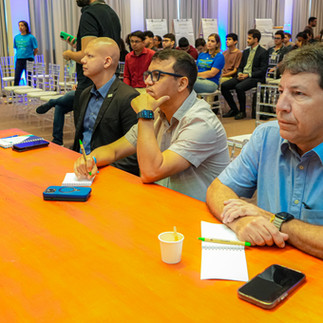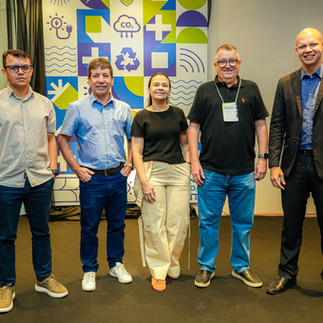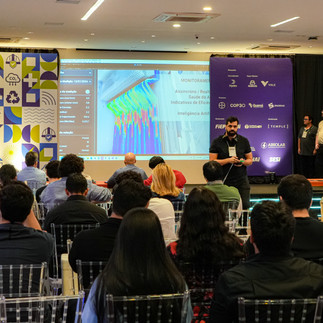Filter Project Made from Mining Waste Wins 2nd COP+ Journey Hackathon
- Sep 21, 2025
- 3 min read

A filter made from mining waste, designed to attach to the exhaust system of vehicles and heavy machinery to capture carbon—and which can later be reused and transformed into another material—took first place at the 2nd COP+ Journey Hackathon, winning a R$20,000 prize. Called Filter+, the project topped a competition that wrapped up on Saturday, the 13th, after 33 hours of immersion, during which professionals, students, and researchers developed solutions to help decarbonize mining in Pará. In total, ten projects were created and evaluated by a jury of experts in mining and business.
Biochemical engineer and biotechnology master’s student Jonas Cunha was one of Filter+’s creators. The team was entirely composed of biochemical engineers and postgraduate biotechnology students from the Federal University of Pará (UFPA). For Jonas, the hackathon was a marathon of learning about the mining sector. “We spent three days trying to understand the challenges of mining so we could develop Filter+. But we weren’t satisfied with just creating the filter—we also found a way for the saturated filter to be turned into a concrete block, giving the project two functions in one,” he explained.
Second place went to Reflora C+, a digital platform for the intelligent selection of plant species with high carbon capture potential, aiming to make reforestation of mining-degraded areas more efficient. The project, which won R$10,000, was led by Priscila Sanjuan, a biologist and postdoctoral researcher at the Vale Technological Institute. Participating in a hackathon for the first time, she brought an idea that was quickly embraced by students from other fields. “I came alone, without any colleagues, just curious to see how it worked. I had never taken part in one; my world is pure research. For me it was all new and, to my surprise, the team members liked and supported my idea. I had the technical expertise from science, which wasn’t originally planned for this scope. Working with them brought new perspectives, questions, and knowledge levels, which was very enriching for me and for the final result,” she said.
Third place, with a R$5,000 prize, went to LOC B, a project that maps CO₂ use and storage within the mining process to increase mine safety and reduce emissions. The team consisted entirely of Computer Engineering students from the Centro Universitário do Pará (CESUPA). “The hackathon experience was incredible. It brings together brilliant minds to create new ideas or improve existing ones. We didn’t know anything about mining or how carbon is absorbed into the soil. The hackathon gave us that insight and showed us how vast and powerful mining can be. The mentors were also essential in building the project,” said student Pedro Belchior.
The jury was composed of Lourival Ferreira, Social Value Projects Director at Vale’s Northern division; Carlos Eduardo Neves, Vice President of Operations at Hydro; Érika Amoras, Executive Manager of the Pará State Mining Industries Union (Simineral); Daniel Sobrinho, Director of the Federation of Industries of the State of Pará and State Coordinator of Absolar in Pará; and Anderson Santos, Executive Manager of the Brazilian Mining Institute (IBRAM).
For Anderson Santos, the 2nd COP+ Journey Hackathon was a success from the very start, with its focus on sustainability in mining. “IBRAM had to be here, because this is about sustainable mining and how to pursue decarbonization in the mineral sector. With COP taking place soon in Belém, mining needs to have a seat at the table to discuss and address this critical issue. After all, we can’t talk about decarbonization, energy transition, or renewable and clean energy without talking about critical minerals,” he emphasized.
The judge praised the quality of the projects developed. “Many of the projects truly brought innovative solutions, as many mining companies are investing in innovation and technology to find ways to decarbonize. The winning project stood out for using mining waste to capture carbon and then transform it. It was very rewarding to see all these brilliant projects,” he concluded.
The 2nd COP+ Journey Hackathon was organized by the Federation of Industries of the State of Pará (FIEPA). The COP+ Journey itself is carried out by the National Confederation of Industry (CNI) and the Instituto Amazônia+21, co-organized by Hydro, with super master sponsorship from Vale and Albras, and premium sponsorship from Guamá Waste Treatment, SINOBRAS, and Bayer. The initiative was conceived by Temple Comunicação and is supported by Ação Pró-Amazônia, the Amazon Legal Interstate Consortium, the Brazilian Chamber of Construction Industry (CBIC), the Brazilian Association of Photovoltaic Solar Energy (ABSOLAR), SESI, and SENAI.
See more images from the grand finale:














































